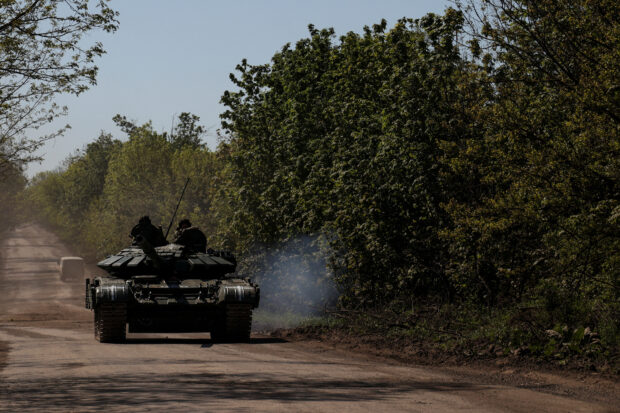
Ukrainian servicemen ride atop of a tank on a road to the frontline town of Bakhmut, amid Russia’s attack on Ukraine, in Donetsk region, Ukraine May 12, 2023. (REUTERS)
KYIV – Russia said on Friday that Ukrainian forces had attacked Russian positions along almost 100 km (60 miles) of the front line near Soledar, a small mining town near Bakhmut in eastern Ukraine that Moscow’s forces seized in January.
As anticipation grows of a Ukrainian counteroffensive aiming to drive Moscow’s forces out of the land they have seized in the last 15 months, Deputy Defence Minister Hanna Maliar confirmed earlier reports that Ukraine had made some gains near Bakhmut, but appeared to play down suggestions of a wider push.
The Russian Defense Ministry said 26 attacks involving over a thousand troops and up to 40 tanks near Soledar on Thursday had been repulsed. In one area, Russian forces had fallen back to “more favorable positions” near a reservoir northwest of Bakhmut.
Reuters was not able to verify the battlefield reports, and there was no immediate response from Kyiv, which during previous offensives has maintained strict silence about its operations while they were under way.
An attack at Soledar, just north of Bakhmut, would appear to substantiate reports by Russia’s Wagner private army that Kyiv was launching its offensive on the city’s north and south flanks, aiming to surround it. Earlier this week, a Ukrainian unit claimed to have routed a Russian brigade southwest of Bakhmut in Ukraine’s biggest advance for six months.
Wagner leader Yevgeny Prigozhin has said the flanks, guarded by regular troops, are crumbling, putting his group’s positions inside the city at risk. Russia’s defense ministry denied this.
Without giving details, Ukrainian deputy defense minister Maliar said Kyiv’s forces had advanced by about 2 km (1 mile) this week around Bakhmut without ceding any ground. A claim of such swift progress is rare in an attritional battle in which Russia has made incremental advances over the last 10 months without being able to claim the city.
But she seemed to imply this was not the start of the major, long-awaited assault: “This situation has actually been going on in the east for several months,” she wrote. “That’s it! Nothing more is happening.”
Moscow has been preparing since last autumn for an expected onslaught, and built lines of anti-tank fortifications along hundreds of miles of front.
It has also begun evacuating civilians who have been living near the conflict zone in Ukraine’s partially occupied Zaporizhzhia province to areas farther from the expected advance by Kyiv’s forces.
“We used to go out and watch (the shelling). Especially at night, you could see the flashes as they launch,” said Lyudmila, a 22-year-old from Kamianka-Dniprovska now in makeshift accommodation in the Russian-controlled Ukrainian port of Berdyansk.
“We’ve had shells land nearby and when it landed the entire sky was red,” she said.
In comments published on Friday, the commander of Russia’s Black Sea Fleet said its defenses were also being tightened amid a flurry of Ukrainian drone strikes targeting its home base, the Crimean port of Sevastopol.
UKRAINE IS STRONGER NOW, ZELENSKY SAYS
Ukrainian President Volodymyr Zelensky warned in a Telegram post that “our path ahead is not easy”, but said Ukraine was “much stronger now than last year or in any other year of this war for freedom and independence of our country”.
Western countries have sent hundreds of modern tanks and armored vehicles to Ukraine and trained thousands of its soldiers in anticipation of the offensive.
On Thursday Kyiv secured a promise from Britain of long-range cruise missiles, breaking one of the last big Western taboos over weaponry previously deemed to carry too great a risk of provoking Russia. In the past, other allies have quickly followed suit after Britain announced new types of weapons.
Russia for its part has tried to dodge Western sanctions to buy weapons, such as drones from Iran, where it can. Washington has warned countries that they could face sanctions for providing material support to Russia’s invasion.
In South Africa, which says it is neutral, a minister responsible for arms control said the government had not approved any weapons shipments to Russia late last year, after the U.S. ambassador said a Russian ship had picked up arms there in December. President Cyril Ramaphosa has announced an inquiry.
The war between two major farm exporters has worsened a global food crisis and, while an agreement brokered by Turkey and the U.N. last July safely reopened some Black Sea grain shipment channels, talks to extend it have been difficult.
Russia has threatened to quit the arrangement on May 18. Turkish Defense Minister Hulusi Akar said parties to the pact were nearing a deal to extend it, but the Kremlin said there was nothing new to report.